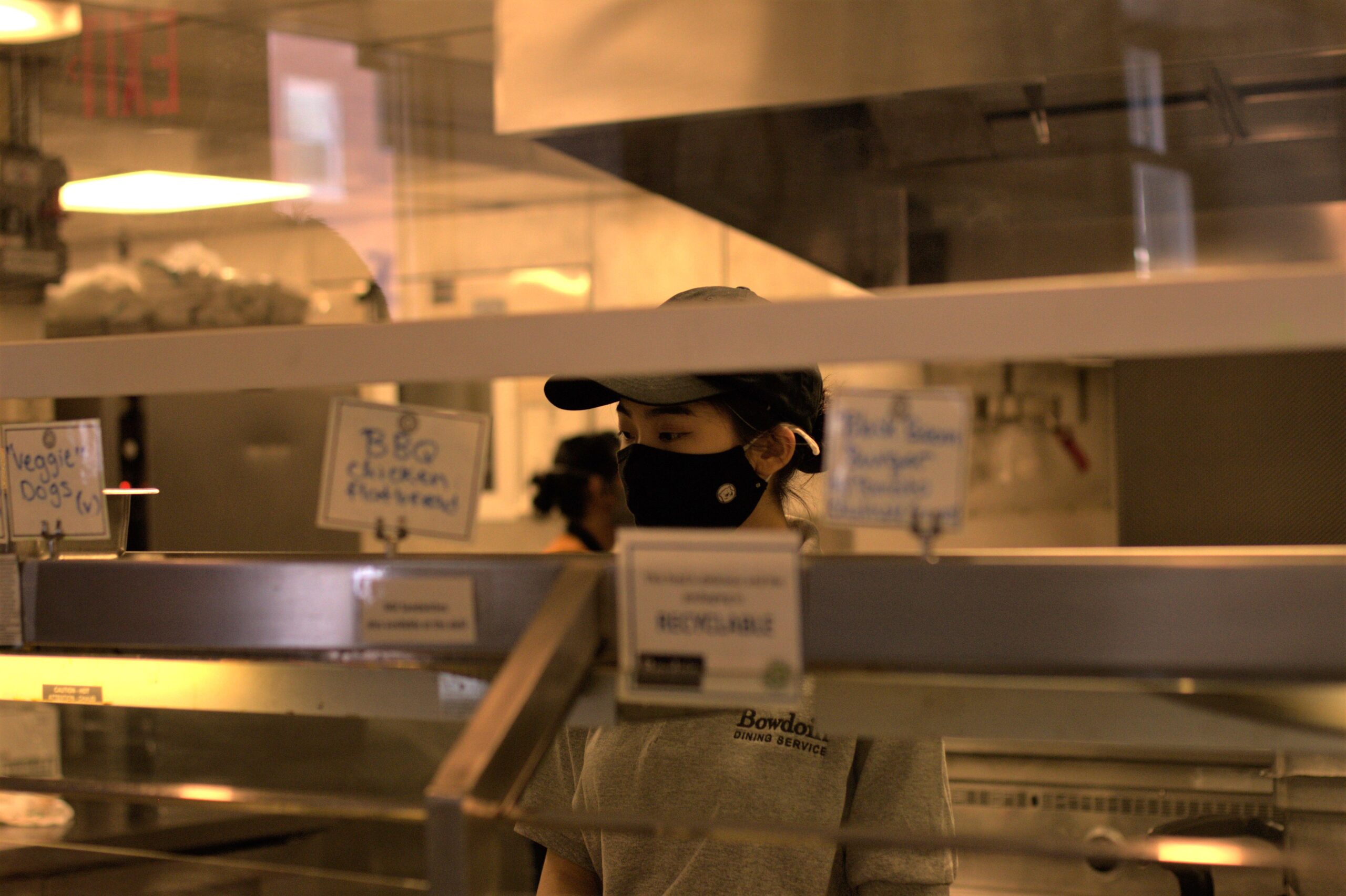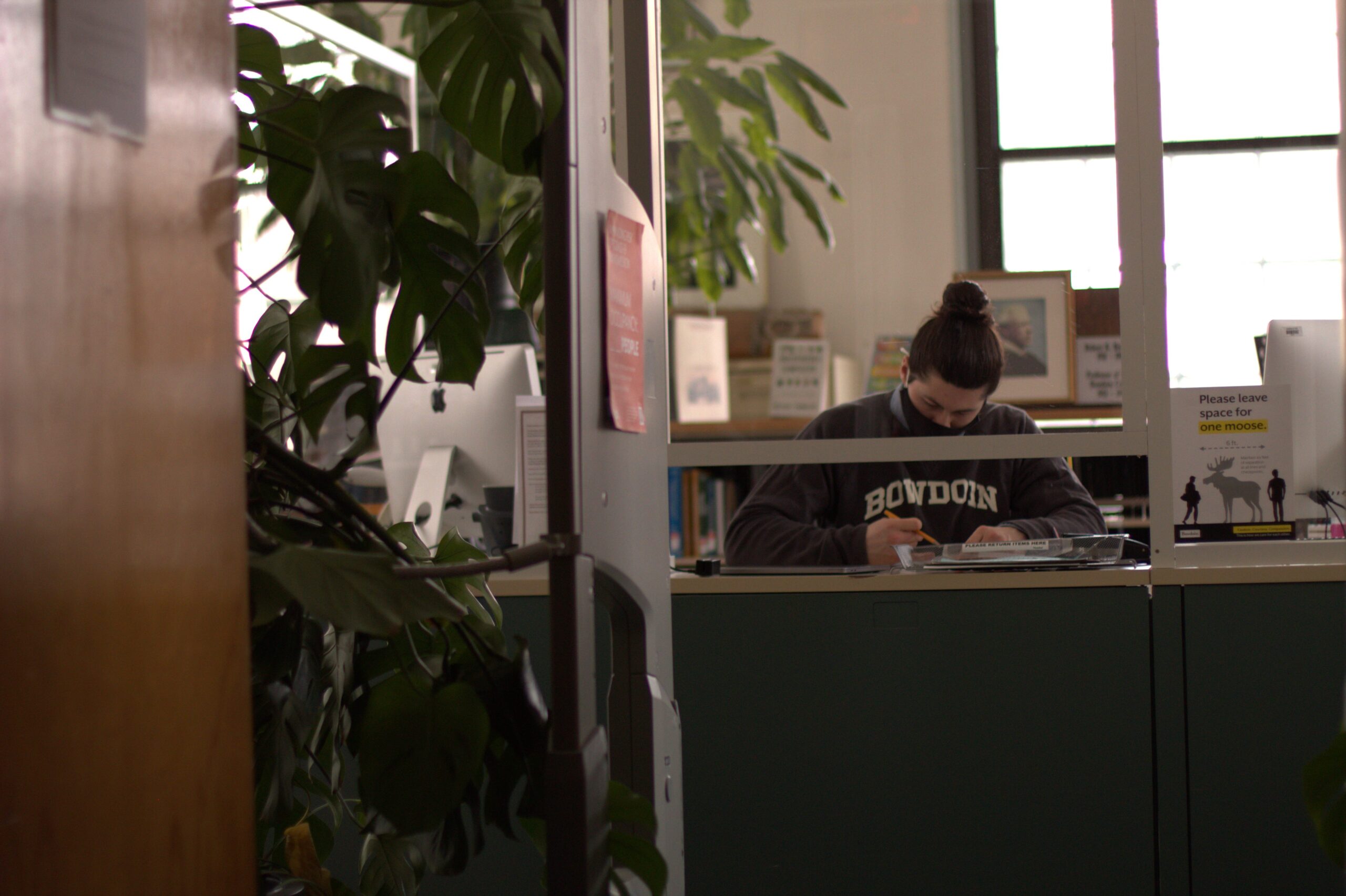Students return to work amid fewer job opportunities on campus
February 26, 2021
 Ben Mathews
Ben MathewsWhen Emma Hargreaves ’23 was hired as a server at Thorne Hall in February, she anticipated regular hours and a steady income.
“I wanted to do two or three shifts a week,” she said in a Zoom interview with the Orient. “Now I’m only scheduled for one. It’s frustrating; the shifts I could’ve done were snapped up really quickly.”
For many students counting on on-campus employment for a paycheck, opportunities are slim.
“I’ve been struggling to get a paying job on campus since COVID started,” Sara Nelson ’22 said in a Zoom interview with the Orient. “I have one shift now, which I’m okay with, but it’s been rough. There’s a lot of demand for work right now especially because so many people weren’t able to save any money over the break, but there just aren’t that many jobs.”
Deborah Infante, the staffing coordinator for Bowdoin Dining, attributes this shortage to a lack of necessity.
“With our population cut down so much, we have less of a need for student employees because we have enough full- and part-time staff to fill the void,” she said in a Zoom interview with the Orient. “We just aren’t feeding as many people.”
Students able to secure a position in Dining Services report an overall positive working environment.
“My job has become a very important part of my Bowdoin experience,” Hannah Scotch ’22, who works in Thorne, said in a Zoom interview with the Orient. “There’s a core group of people that get along really well, and it feels like a very safe environment.”
Nelson seconded this sentiment, though also noting the increased risk that comes with working in close quarters during a pandemic.
“The overlap with off-campus workers is a little worrisome,” Nelson said. “But we are really careful: we do temperature checks and work separately.”
Given the reduced capacity for employees this semester, students work on a first-come, first-serve basis.
“When people contact me, I send them the schedule and say ‘this is what I have open,’” Infante said. “Whoever gets back to me first asking for a shift gets the shift.”
While this policy provides all student dining employees a chance to work, it is also a source of anxiety and frustration for students who have to constantly check what shifts are open and cannot as easily develop a consistent work routine.
“The only way to escape stress is to disconnect from devices,” Hargreaves said. “But in order to make money you have to be on the constant look-out.”
Intense competition for work is not confined to Dining Services. Under normal circumstances, the library is the source of employment for around 60 students. Since the beginning of the spring semester, however, that number has been cut.
 Ben Mathews
Ben MathewsThomas Bao ’21, a Hawthorne-Longfellow Library employee, was grateful to have an on-campus job, but at the same time worried for those who were unable to secure employment.
“Luckily, I still have a job,” Bao said. “But for a lot of people it’s going to be rough. There are no jobs on campus.”
Bao cited how for some Bowdoin students, employment is the source of spending money throughout the semester. For others, though, on campus jobs are essential, even with the College’s decision this semester to replace the work-study requirement for aided students with a direct grant.
“For a lot of students who rely on financial aid, certain things aren’t covered,” Bao said, referring to certain living expenses. “So the fact that there is a job deficit is apparently putting the hurt on a lot of people.”
Theodore Danzig ’22 has also been working in the library since his freshman year, and is currently employed as a Student Library Assistant in the circulation department.
“I worked ten or eleven hours [a week] my freshman spring and eight hours [a week] in my sophomore year,” Danzig said in a phone interview with the Orient. “Now I have five hours a week. But I just feel fortunate to have the work.”
Although reduced on-campus employment poses many issues to the students that normally fill those jobs, Bao feels Bowdoin faces a difficult moral challenge given the risk of bringing more students into the workplace.
“It’s sort of a ‘damned if you do, damned if you don’t’ type of situation,” Bao said. “[The College] can employ a lot of students who rely on these jobs normally, but at the same time, Bowdoin would be putting them at risk.”

Comments
Before submitting a comment, please review our comment policy. Some key points from the policy: